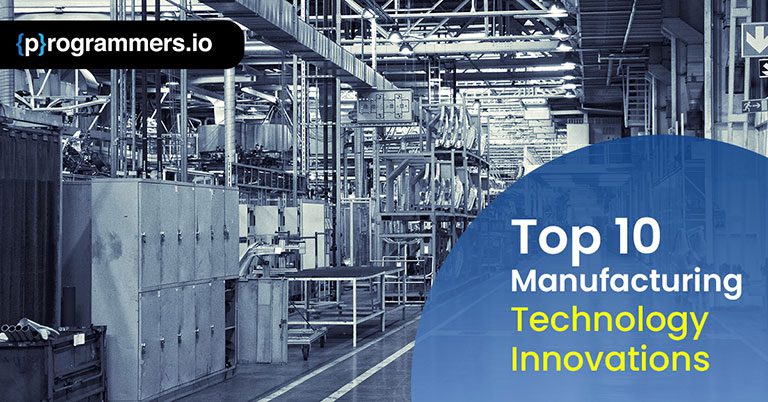Top 10 Manufacturing Technology Innovations
In the first quarter of 2022, the United States’ manufacturing output was over $2.7 trillion.
The manufacturing sector refers to a broad range of industries. Manufacturers use raw materials to produce goods.
With production demands growing, businesses are developing new manufacturing technology.
In this article, we’ll explore ten manufacturing technologies. Examples like artificial intelligence and robotics are already in use. Other examples are still in development.
These new manufacturing technologies will transform manufacturing processes. This tech includes software, programming developments, and devices.

Read on to learn everything you need to know about the top ten pieces of manufacturing tech!
1. Artificial Intelligence
Artificial intelligence (or AI) is any technology that mimics human intelligence. This technology can collect information and use it to change how tasks are completed.
AI has many applications, but the biggest is in logistics. Manufacturers can use AI to handle their shipping management and scheduling.
Artificial intelligence can predict things like production demand and material usage. This can help manufacturers increase their efficiency by ordering precise amounts of materials.
Machines using AI also keep businesses efficient by collecting production data. This data lets business owners know where they can improve their facilities.
Another application of AI is already in use. Machines can self-diagnose to predict maintenance needs.
In the past, manufacturers had to wait for machines to break down. Now, they can have AI check equipment for issues and notify them of upcoming maintenance.
2. Quantum Computing
This is an example of manufacturing technology that doesn’t have many applications yet. Quantum computing will transform the manufacturing industry when it is widely available.

Ordinary computers use transistors to process information. Transistors represent either a 1 or a 0.
A quantum computer uses qubits, which can represent 1 or 0 at the same time. IBM and Google are spending billions building their first quantum computers.
3. Industrial Internet of Things
The Internet of Things (IoT) is the idea of connecting everyday items to the internet to collect data. The most common example of IoT is “smart home” technology like the Amazon Echo.
When applied to manufacturing machinery, it’s called the Industrial Internet of Things.
With this technology, production machinery can collect data and send reports. With IIoT, machines connect to a private network and collect data for an entire facility.
4. Programming Languages
A programming language is a notation system used to create programs. There have been thousands of different programming languages since the invention of computers.
With new languages, programs can handle more complex problems using less coding. For example, Python has almost entirely replaced COBOL.

In manufacturing, advancements in programming languages will make computing cheaper and faster. Universal programming languages also make it easier to program robotics for complex tasks.
5. 3D Printing
3D printers produce complex objects from digital models. This technology can be used with plastics, metals, and even concrete.
3D printing has become more available and practical for manufacturing. It is much faster and produces less waste than traditional manufacturing processes.
3D printing also allows manufacturers to produce prototypes faster. Manufacturers can quickly develop new products by minimizing design to production time.
6. Augmented Reality
Augmented reality is a technology that changes how you see your environment. Using AR, workers can easily see all kinds of information about a piece of equipment.
With AR technology in manufacturing, machine operators can use their smart devices to check on equipment. The device will show a status report for the machine they point it at. This report could show things like temperature or mechanical issues.

Businesses can reduce waste by using AR for training simulations. AR and VR (virtual reality) are already being used to train welders and HVAC technicians.
Implementing AR can also allow maintenance technicians to diagnose machines remotely.
7. 5G
Connecting devices to the internet is only one part of transforming manufacturing. The connection needs to be fast enough to handle modern problems.
A faster internet connection makes automated production more efficient.
5G, the fifth generation of mobile networks, is faster than the previous 4G. The development of 5G increased network speed, reducing latency and processing time.
Not only are 5G connections faster, but they can also transfer more data.
5G networks will help manufacturers create automated “smart facilities.” By reducing latency, devices can communicate in real time with no delays
8. Robotics
Robots have become available even to small businesses in recent years. By automating repetitive tasks, manufacturers can use human workers for more productive roles.
Robots can perform repetitive processes with no breaks in production. They are now advanced enough to perform highly complex functions without human error.

Robots can do things like assembly, welding, and painting. Using robotic technology can help businesses increase efficiency and precision.
9. Cloud Computing
Cloud computing is the internet version of what a physical computer does. Things like data storage, processing, and entire servers can all take place in the cloud.
Manufacturers can use cloud computing for everything from production to logistics. Facilities can be connected through the cloud to exchange data across the world.
With many facilities connected on one network, production standards are more uniform. Cloud computing also helps reduce production time and costs.
10. Wearable Technology
We’ve all seen people wearing smartwatches. Wearable technology also has many applications in manufacturing.
Smartwatches and wristbands can track health risks like heart rate or blood pressure.
Wearable technology can even work with eyewear to integrate AR into manufacturing. Instead of using a phone or tablet, workers can have digital overlays right in their eyewear.
This technology will change the way manufacturers train and care for employees. It will also make work tasks easier and safer.
The Future of Manufacturing Technology
With these advancements in technology, the manufacturing sector will only become more efficient. Businesses will be more efficient and safer, and production will become easier.
New manufacturing technology will transform the way workers interact with machinery. As production workers use more new technology, manufacturing becomes safer and faster.
Are you interested in making your business more efficient using tech and software? Contact us today to find out how we can take your business into the future!












